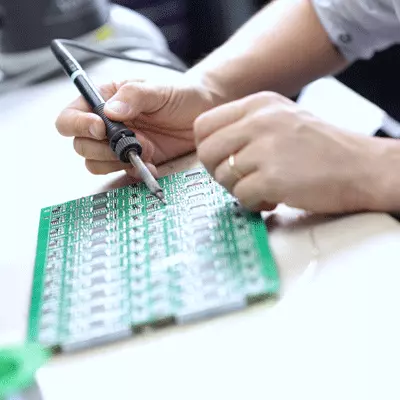Assembly technician
You have been offered a position as Assembly technician and want to know more on the role. Like what you will do and what education is needed before you can start in this role. On this page we will provide you with the details on the role of an assembly technician. And we will provide an overview for the industries we have frequent new positions we hire for. On this page you will also read more on the machines or special equipment you might need to operate in this role in factories, warehouses or other locations with assembly lines.
GO Jobs has a special and proven process to get you successfully setup for your new job in Holland. Read more on this GO Jobs Roadmap.

What does an Assembly technician do

In summary, assembly technicians are skilled workers who are responsible for assembling and installing equipment and machinery using technical drawings, schematics, and assembly instructions. They also test and troubleshoot the assembled products to make sure they meet specifications and are functional.
See below a more detailed overview for the activities you might perform in this role. The list below is just a selection of activities. In the role you might be asked to perform other activities. The type of activities depend heavily on the organization you work for. Please contact the recruiter if you want to know more on a specific position you want to apply for.
Assembly technicians and assembly employees can be found in a wide range of industries, including manufacturing, aerospace, automotive, medical device, and consumer electronics.
The specific duties of an assembly technician can vary depending on the industry, but typically include:
In summary, an assembly technician is a skilled worker who is responsible for assembling and installing equipment and machinery, by reading and interpreting technical drawings, schematics, and assembly instructions. They also test and troubleshoot the assembled products to make sure they meet specifications and are functional. They work in various industries and are responsible for ensuring that the products are assembled correctly, safely and efficiently.
Please contact the recruiter if you want to know more on a specific position you want to apply for.
Active Jobs we Hire for
Curious for the active jobs at the customers we currently hire for? Click the button below and see the active jobs. Please feel free to Contact us if you can not find the job you are looking for. So we can help you further.
How to become an assembly technician?
Becoming an assembly technician typically requires a combination of education and on-the-job training. The specific requirements can vary depending on the industry, but here are a few general steps one can take to become an assembly technician:
- Obtain a high school diploma or equivalent: A high school diploma or equivalent is usually the minimum education requirement for becoming an assembly technician.
- Consider vocational education or trade schools: Some vocational schools or trade schools offer programs specifically designed for assembly technicians. These programs can provide hands-on training and prepare students for entry-level positions.
- Get on-the-job training: Many assembly technicians learn their skills through on-the-job training. This can include working with experienced technicians, attending training sessions, and participating in apprenticeships.
- Gain experience: Assembly technicians who have experience in their field tend to be more competitive in the job market. Seek opportunities to gain experience through internships, part-time jobs, or volunteer work.
- Obtain certifications: Some industries may require assembly technicians to obtain certifications. This may include certifications related to safety, quality control, or specific equipment or machinery.
Where can I work as an assembly technician?

Assembly technicians can be found in a wide range of industries, including manufacturing, aerospace, automotive, medical device, and consumer electronics. They work in manufacturing facilities, assembly plants, repair and maintenance shops and are responsible for ensuring that the products are assembled correctly, safely and efficiently. They also troubleshoot and repair any issues that arise during the assembly process.
Assembly technicians can work in a variety of industries and settings, including:
Active Jobs we Hire for
Curious for the active jobs at the customers we currently hire for? Click the button below and see the active jobs. Please feel free to Contact us if you can not find the job you are looking for. So we can help you further.
The GO Jobs Process – make it easy
At GO Jobs we are specialized in helping Greek professionals in finding their new career in the Netherlands. We will make it easy for you to find the job you want and we help you even with the rest. We take the extra step. Based on our proven process we help you with housing and mobility. Our Welcome team is there to support you, to support you to achieve success and to expand the GO jobs family.
Read more on the GO Jobs process
What is vocational education?
Vocational education, also known as career and technical education (CTE), is a type of education that focuses on teaching the skills, knowledge, and training needed for specific careers or trades. It is designed to provide students with the practical skills and experience needed for a particular job or field, rather than a general education.
Vocational education programs can be found at the secondary, post-secondary and adult education level. The programs can be offered in high schools, vocational or technical schools, community colleges and trade schools. The programs can also be offered in an apprenticeship format, where students learn on-the-job while working with experienced professionals.
Vocational education can include a wide range of fields such as healthcare, manufacturing, construction, automotive, and information technology, among others. The curriculum is designed to provide students with hands-on training and real-world experience, which can include laboratory work, internships, and apprenticeships.
Vocational education is often seen as an alternative to traditional four-year college education, and it can be a cost-effective way to learn a trade or skill. Graduates of vocational education programs can find jobs in a wide range of industries, and they may have the opportunity to advance in their careers and earn higher salaries than those without vocational education.